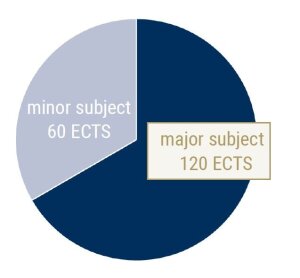- Faculty of Arts
History
- Degree
- Bachelor of Arts
- Supplement to degree
- major in a multi-subject bachelor’s programme
- Admission restriction
- without admission restriction (without NC)
- Duration
- 6 Semesters
- Credits/ECTS
- 120
- Teaching language
- German
- Tuition fee
- None
- Semester contribution
- € 305,05
- Start of studies
- Winter semester
- Part-time possible
- Yes
- Institutions
- Faculty of Arts
- Institute of History
Programme content
Studying History means immersing yourself in the diversity of the living past, developing questions, recognising connections, seeking declarations - and being curious in the process. The Bachelor's degree programme in History introduces you to the basics of all eras of the subject, from antiquity to the Middle Ages, the early modern period, the 19th and 20th centuries and the present day.
The broad-based teaching of methodological knowledge enables you to engage intensively and self-employed individuals|freelancers with historical issues as well as social and cultural problems. An integrated internship also offers you the opportunity to apply the knowledge acquired during your studies at an early stage and makes it easier for you to enter the world of work and professional life.
Structure
Multi-subject bachelor’s programme
Picture: Sophie BartholomeThe Bachelor's degree is the first professional qualification. The standard period of study|regular programme length is six semesters in total, during which various forms of courses (e.g. seminars, lectures or tutorials) are offered for the individual modules.
A multi-subject Bachelor's degree consists of a major subject with 120 credit points (abbreviation: LP / 1 LP = 30 hours of attendance, preparation and follow-up work|follow-up activity, learning and assessed coursework and examinations) and a supplementary subject with 60 LP.
Why study in Jena?
- The Institute of History, which can look back on over 150 years of academic tradition, is one of the leading institutes of its kind in Germany with diverse international co-operations. The degree programmes on offer are geared towards the research-oriented teaching of historical thinking and historical working methods with a particular focus on the period around 1800 and contemporary history in its respective European and transatlantic contexts.
- A special feature of the degree programme in Jena is the tender in Eastern European, Western European and North American History. Depending on your interests, you have the opportunity to focus on specific epochs and regions.
What can you do after your studies?
Career opportunities:
- Media (publishing, print media, radio, television)
- Documentation (museums, libraries, archives)
- adult education
- Public relations
- Foundations
- Non-governmental organisations (NGOs)
- tourism
Downloads and links for the degree programme
What are we looking for in prospective students?
- Interest in analysing complex political, social and cultural problems of the past
- Knowledge and skills from school subjects in the social sciences, cultural studies and humanities
- Textual confidence and not afraid of a high reading workload
- Knowledge of English and a willingness to learn other languages
Admission requirements
-
University entrance qualification
A university entrance qualification, such as a general secondary school leaving certificate, is required for admission onto the study programme.
More information on university entrance qualifications can be found here.
-
Language requirements
English (B1) and two other modern foreign languages (B1 each) OR two modern foreign languages (B1) and advanced knowledge of Latin (or other ancient language) OR one modern foreign language (B1) and one other modern foreign language (B2)
Proof at the latest by the time of registration for the specialization module.
Missing language certificates can be acquired and submitted during the course of the degree programe.
Contacts
Room E 005
Fürstengraben 13
07743 Jena
Google Maps site planExternal link
Bachstraße 18k
07743 Jena
Telephone hours:
Mondays and Fridays (9:00 – 11:00)
Wednesdays (13:00 – 15:00)
The ASPA is primarily responsible for students in the Faculty of Social and Behavioural Sciences, the Faculty of Arts and Humanities, and the Faculty of Theology.
Postal address:
Akademisches Studien- und Prüfungsamt
Fürstengraben 1
07743 Jena
Fürstengraben 13
07743 Jena
Google Maps site planExternal link
University Main Building / SSZ
Fürstengraben 1
07743 Jena
Google Maps site planExternal link
Office hours:
We offer consultations in person, by telephone, and via Zoom. You can make an appointment by calling us on +49 3641 9-411111 (Mondays to Fridays from 9:00 to 11:00) or outside these office hours on +49 3641 9-411200. You can also use our remote help desk.
Consultation hours:
Mondays, Tuesdays, Thursdays and Fridays (9:00 to 12:20), Tuesdays (14:00 to 18:00), and Wednesdays and Thursdays (14:00 to 16:00).
Video chat: To the video chat – Zoom Videochat ZeitenMondays to Fridays (12:30 to 13:00) Password ZSB2020 Data protection informationpdf, 101 kb
University Main Building, Room E065
Fürstengraben 1
07743 Jena
Google Maps site planExternal link
Opening hours:
Information Desk (UHG; Room E0.65)
Mondays (10:00 – 12:00)
Tuesdays (13:00 – 15:00)
Wednesdays (10:00 – 12:00)
Thursdays (13:00 – 15:00)
Fridays (10:00 – 12:00)
You can also use our remote help desk at
www.uni-jena.de/service-ssz
or send us your enquiries by post.
Telephone hours:
Mondays to Fridays
(9:00 – 11:00)
Postal address:
Friedrich-Schiller-Universität Jena
Studierenden-Service-Zentrum
07737 Jena
University Main Building
Fürstengraben 1
07743 Jena
Google Maps site planExternal link
